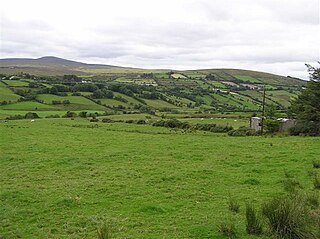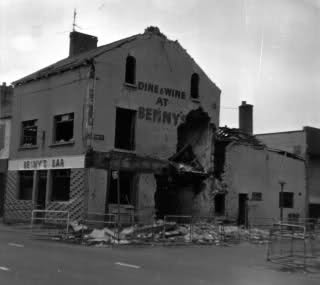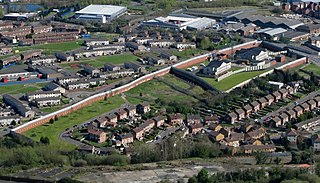Related Research Articles

The Troubles were an ethno-nationalist conflict in Northern Ireland that lasted for about 30 years from the late 1960s to 1998. Also known internationally as the Northern Ireland conflict, it is sometimes described as an "irregular war" or "low-level war". The conflict began in the late 1960s and is usually deemed to have ended with the Good Friday Agreement of 1998. Although the Troubles mostly took place in Northern Ireland, at times violence spilled over into parts of the Republic of Ireland, England, and mainland Europe.

The Milltown Cemetery attack took place on 16 March 1988 at Milltown Cemetery in Belfast, Northern Ireland. During the large funeral of three Provisional IRA members killed in Gibraltar, an Ulster Defence Association (UDA) member, Michael Stone, attacked the mourners with hand grenades and pistols. He had learned there would be no police or armed IRA members at the cemetery. As Stone then ran towards the nearby motorway, a large crowd chased him and he continued shooting and throwing grenades. Some of the crowd caught Stone and beat him, but he was rescued by the police and arrested. Three people were killed and more than 60 wounded. The "unprecedented, one-man attack" was filmed by television news crews and caused shock around the world.
Raymond "Ray" Smallwoods was a Northern Ireland politician and sometime leader of the Ulster Democratic Party. A leading member of John McMichael's South Belfast Brigade of the Ulster Defence Association (UDA), Smallwoods later served as a leading adviser to the UDA's Inner Council. He was killed by the Provisional Irish Republican Army (IRA) outside his Lisburn home.

The Shankill Road bombing was carried out by the Provisional Irish Republican Army (IRA) on 23 October 1993 and is one of the most well-known incidents of the Troubles in Northern Ireland. The IRA aimed to assassinate the leadership of the loyalist Ulster Defence Association (UDA), supposedly attending a meeting above Frizzell's fish shop on the Shankill Road, Belfast. Two IRA members disguised as deliverymen entered the shop carrying a bomb, which detonated prematurely. Ten people were killed: one of the IRA bombers, a UDA member and eight Protestant civilians, two of whom were children. More than fifty people were wounded. The targeted office was empty at the time of the bombing, but the IRA had allegedly realised that the tightly packed area below would inevitably cause "collateral damage" of civilian casualties and continued regardless. However, the IRA have denied this saying that they intended to evacuate the civilians before the explosion. It is alleged, and unearthed MI5 documents appear to prove, that British intelligence failed to act on a tip off about the bombing.

This article recounts the violence and other effects related to The Troubles in Portadown, County Armagh, Northern Ireland. Much of it has been related to the Drumcree parade dispute.
The Northern Irish Troubles resulted in 11 deaths in or near the mainly Protestant County Antrim town of Ballymena. Eight people were killed by various loyalist groups, and three by the Irish Republican Army (IRA). Two of the IRA victims were members of the Royal Ulster Constabulary; the other victim was a civilian. Of the eleven victims, six were Protestants and five were Catholics. Some of those killings are described below:

Joe Bratty was a Northern Irish loyalist paramilitant and a leading member of the Ulster Defence Association's South Belfast Brigade. The head of UDA activity in the area during one of the organisation's most active phases, Bratty was suspected by security forces of playing a role in, or at least orchestrating, around 15 killings.
This is a timeline of actions by the Ulster Defence Association (UDA), a loyalist paramilitary group formed in 1971. Most of these actions took place during the conflict known as "the Troubles" in Northern Ireland. The UDA's declared goal was to defend Loyalist areas from attack and to combat Irish republican paramilitaries. However, most of its victims were Irish Catholic civilians, who were often chosen at random.
The Battle of St Matthew's or Battle of Short Strand was a gun battle that took place on the night of 27–28 June 1970 in Belfast, Northern Ireland. It was fought between the Provisional Irish Republican Army (IRA), and Ulster loyalists in the area around St Matthew's Roman Catholic church. This lies at the edge of the Short Strand, a Catholic enclave in a mainly-Protestant part of the city. Violence had erupted there, and in other parts of Belfast, following marches by the Orange Order. The battle lasted about five hours and ended at dawn when loyalists withdrew. The British Army and police were deployed nearby but did not intervene. Three people were killed and at least 26 wounded in the fighting, while another three were killed in north Belfast.
This is a timeline of actions by the Ulster Volunteer Force (UVF), an Ulster loyalist paramilitary group since 1966. It includes actions carried out by the Red Hand Commando (RHC), a group integrated into the UVF shortly after their formation in 1972. It also includes attacks claimed by the Protestant Action Force (PAF), a covername used by the UVF. Most of these actions took place during the conflict known as "the Troubles" in Northern Ireland.

The Teebane bombing took place on 17 January 1992 at a rural crossroads between Omagh and Cookstown in County Tyrone, Northern Ireland. A roadside bomb destroyed a van carrying 14 construction workers who had been repairing a British Army base in Omagh. Eight of the men were killed and the rest were wounded. Most were civilians, while one of those killed and two of the wounded were off-duty British soldiers. The Provisional Irish Republican Army (IRA) claimed responsibility, saying the workers were targeted because they were collaborating with the "forces of occupation".

The Benny's Bar bombing was a paramilitary attack on 31 October 1972 in Belfast, Northern Ireland. A unit from the Ulster Freedom Fighters (UFF) of the Ulster Defence Association (UDA), a loyalist paramilitary group, detonated a no-warning car bomb outside the Irish Catholic-owned Benny's Bar in the dockland area of Sailortown, killing two young girls trick-or-treating in the area: Clare Hughes (4); and Paula Strong (6). Twelve of the pub's patrons were also injured in the explosion.

The Springfield Road is a residential area and road traffic thoroughfare adjacent to the Falls Road in west Belfast. The local population is predominantly Irish nationalist and republican. Along parts of the road are several interface area with the neighbouring Ulster loyalist areas of the Greater Shankill. The Springfield Road includes the Ballymurphy and New Barnsley districts and is overlooked by Black Mountain and Divis.

The Battle at Springmartin was a series of gun battles in Belfast, Northern Ireland on 13–14 May 1972, as part of The Troubles. It involved the British Army, the Provisional Irish Republican Army (IRA), and the Ulster Volunteer Force (UVF).

The Ramble Inn attack was a mass shooting at a rural pub on 2 July 1976 near Antrim, Northern Ireland. It is believed to have been carried out by the Ulster Volunteer Force (UVF), a loyalist paramilitary organisation. Six civilians were killed in the attack—five Protestants and one Catholic—and three others were wounded.
The Troubles in Ardoyne lists incidents during the Troubles in the Ardoyne district of Belfast, Northern Ireland.
The Hillcrest Bar bombing, also known as the "Saint Patrick's Day bombing", took place on 17 March 1976 in Dungannon, County Tyrone, Northern Ireland. The Ulster Volunteer Force (UVF), a loyalist paramilitary group, detonated a car bomb outside a pub crowded with people celebrating Saint Patrick's Day. Four Catholic civilians were killed by the blast—including two 13-year-old boys standing outside—and almost 50 people were injured, some severely.
On 14 November 1992, the Ulster Defence Association (UDA), a loyalist paramilitary group, launched an attack on James Murray's bookmakers on the Oldpark Road in Belfast, Northern Ireland. A gunman fired on the customers with an assault rifle, while another threw a grenade inside. Three civilians were killed and thirteen wounded. The shop was in a Catholic and Irish nationalist area, and all of the victims were local Catholics. The attack was likened to the Sean Graham bookmakers' shooting carried out by the UDA earlier that year.
On 2 October 1975, the loyalist paramilitary group the Ulster Volunteer Force (UVF) carried out a wave of shootings and bombings across Northern Ireland. Six of the attacks left 12 people dead and around 45 people injured. There was also an attack in a small village in County Down called Killyleagh. There were five attacks in and around Belfast which left people dead. A bomb which exploded in Coleraine left four UVF members dead. There were also several other smaller bombs planted around Northern Ireland but other than causing damage they did not kill or injure anyone.
The Strand Bar Bombing was a bomb attack on a pub in Belfast, Northern Ireland on 12 April 1975, during the Troubles. The Ulster Volunteer Force (UVF), a loyalist paramilitary group, threw an improvised bomb into a pub frequented by Catholics in the Short Strand neighbourhood, killing six civilians and injuring about fifty others. It took place during a spate of tit-for-tat attacks by loyalists and Irish republican paramilitaries. The attack was claimed by the UVF unit known as the Red Hand Commando (RHC).
References
- ↑ McKittrick, David. Lost Lives. Mainstream, 1999. p.620
- ↑ McKittrick, David. Lost Lives p.631
- ↑ McKittrick, David. Lost Livesp.676
- ↑ McKittrick, David. Lost Lives p.1024
- ↑ McKittrick, David. Lost Lives p.1157
- ↑ McKittrick, David. Lost Lives p.1171-1172
- ↑ McKittrick, David. Lost Lives p.1181
- ↑ McKittrick, David. Lost Lives p.1194
- ↑ McKittrick, David. Lost Lives p.1202
- ↑ McKittrick, David. Lost Lives p.1231
- ↑ McKittrick, David. Lost Lives p.1247
- ↑ McKittrick, David. Lost Lives p.1272
- ↑ McKittrick, David. Lost Lives p.1369-1370